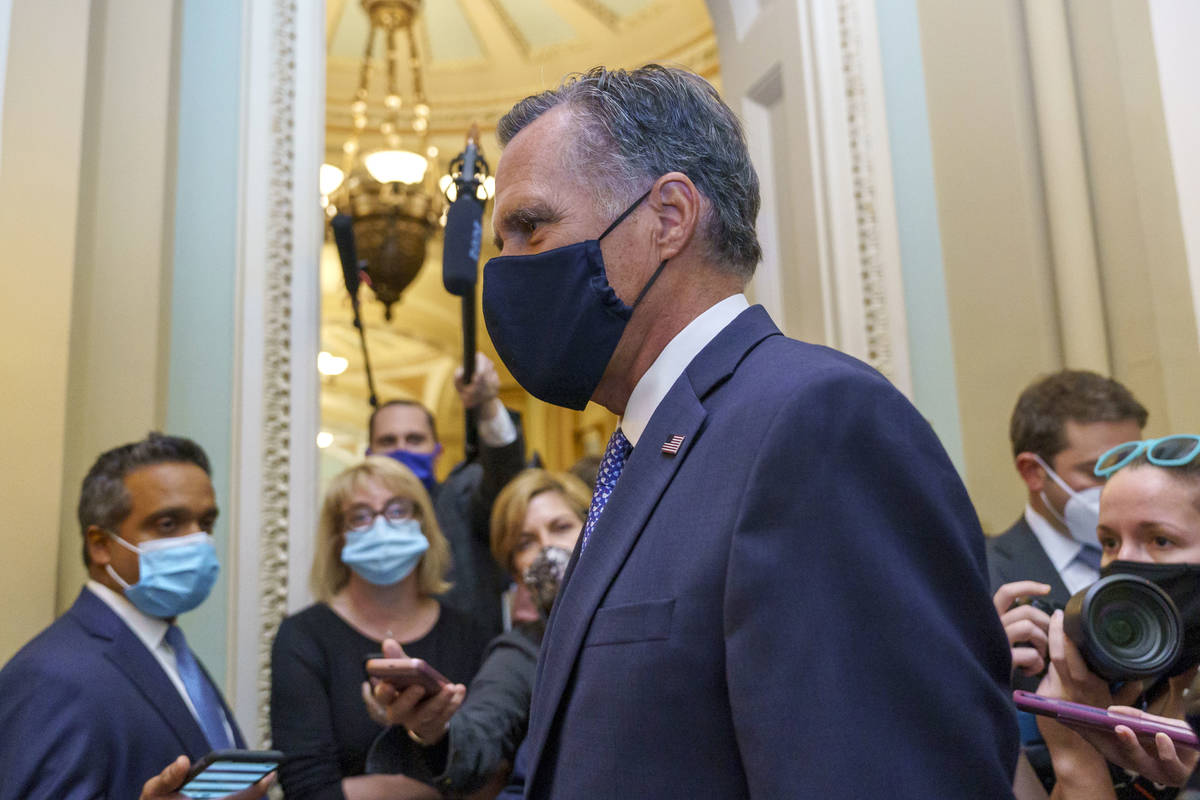Republicans have votes to confirm Trump Supreme Court pick

WASHINGTON — Senate Republicans on Tuesday appeared to lock up the votes needed to confirm President Donald Trump’s nominee to fill a Supreme Court vacancy after Utah Sen. Mitt Romney said he will support the president’s pick regardless of theproximity to the election.
Trump is interviewing candidates for the nomination and is expected to make his pick for the high court seat public on Saturday.
Senate Majority Leader Mitch McConnell, R-Ky., said the Senate will hold a confirmation vote on the Senate floor this year, and Senate Judiciary Chairman Lindsey Graham, R-S.C., said he is prepared to hold hearings. Graham said the votes are there to install a nominee by year’s end.
“Moving ahead with a vote on the forthcoming Supreme Court nomination will be consistent with both history and precedent,” McConnell said from the Senate floor.
Romney, the only Republican to vote for Trump’s impeachment, was in the spotlight after two moderate senators, Lisa Murkowski of Alaska and Susan Collins of Maine, announced that they will not vote on a nominee before the Nov. 3 presidential election.
Democrats were united in urging McConnell to wait until after the presidential election to allow the process to move forward. Democratic presidential nominee Joe Biden said the candidate Americans select to become president in November should make the nomination.
The Constitution, however, says nothing about the political calendar. Article II, Section 2 says the president shall have power to appoint judges of the Supreme Court “by and with the advice and consent of the Senate.”
High stakes
Sen. Catherine Cortez Masto, D-Nev., said the nominee, if confirmed, will vote on health care protections for pre-existing conditions, women’s reproductive rights and voting rights.
“The stakes are that high, and Nevadans and the American people should have their say,” Cortez Masto said, urging a delay in the process.
Senate Republicans set a precedent in 2016 when they refused to consider President Barack Obama’s nominee, Judge Merrick Garland, in a presidential election year, said Sen. Jackie Rosen, D-Nev.
“Now, just over 40 days before Election Day and with voters already casting ballots in states across the country, we must hold Mitch McConnell to his own precedent and ensure that the American people have a say in filling the vacancy,” Rosen said.
Since the Senate is current divided 53-47, Democrats would need four Republicans to defect to block any nomination, since Vice President Mike Pence could cast a tie-breaking vote if the Senate is equally divided.
Romney, as a GOP presidential candidate in 2012, spoke in support of overturning Roe v. Wade, the 1973 Supreme Court ruling that established abortion rights nationwide.
Murkowski and Collins, both of whom support abortion rights, said Republicans should respect the precedent set in 2016 when Garland was denied a hearing or a vote by McConnell because the vacancy occurred in a presidential election year.
But McConnell has argued that he did not allow the vote in 2016 because the president was a Democrat and the Senate was controlled by Republicans. This year, both the White House and the Senate are under GOP control.
Romney cited the Constitution as the basis for his decision to back the process moving forward.
“The historical precedent of election year nominations is that the Senate generally does not confirm an opposing party’s nominee, but does confirm a nominee of its own,” Romney said in a statement.
Romney said he would vote to confirm a nominee based on the person’s qualifications.
“I’m just following the law,” he said.
Trump has a shortlist of candidates who include female jurists. The president is speaking and meeting with the candidates this week.
Intro coming soon
An introduction of the nominee is expected Saturday at the White House, following three days of memorials at the Supreme Court and the Capitol for Justice Ruth Bader Ginsburg, 87, who died last week following a long battle with cancer.
Appointed by President Bill Clinton, Ginsburg became a liberal lion and an advocate for women’s rights.
She also became a cultural icon for her stance on civil rights, earning the moniker “the Notorious RBG.”
Her family told National Public Radio that on her deathbed, she said her “most fervent wish” was that she not be replaced until after the election.
Trump, who had been the target of Ginsburg’s criticism, scoffed during a campaign rally at the deathbed request. He suggested that it had been concocted by liberal supporters of Ginsburg.
The Biden campaign has stressed that the Democratic message on the Supreme Court vacancy should focus on the issues that will be decided by the court, particularly health care and the federal lawsuit backed by the administration to eliminate the Affordable Care Act, commonly known as Obamacare.
Supreme Court justices have scheduled arguments in an ACA case in November, after the election, with a decision expected next year.
Trump administration officials have argued that the president would protect health care coverage for people with pre-existing conditions.
But Democratic lawmakers, including Cortez Masto and Rosen, said voters, including those with pre-existing conditions, are concerned about the administration’s attempts to take away their health care coverage through Obamacare during the coronavirus pandemic.
They point to Trump and Senate and House Republican attempts to repeal the law in the last Congress.
Democrats say the federal lawsuit that the Supreme Court will hear would repeal the law and protections if jurists uphold a lower court’s ruling.
Contact Gary Martin at gmartin@reviewjournal.com or 202-662-7390. Follow @garymartindc on Twitter.